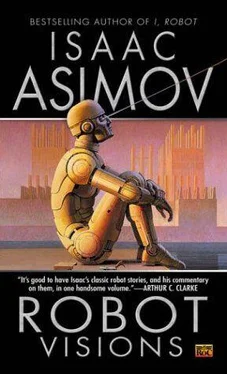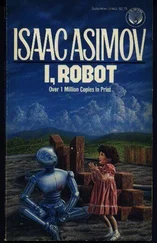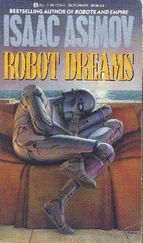Isaac Asimov - Robot Visions
Здесь есть возможность читать онлайн «Isaac Asimov - Robot Visions» весь текст электронной книги совершенно бесплатно (целиком полную версию без сокращений). В некоторых случаях можно слушать аудио, скачать через торрент в формате fb2 и присутствует краткое содержание. Жанр: Фантастика и фэнтези, на английском языке. Описание произведения, (предисловие) а так же отзывы посетителей доступны на портале библиотеки ЛибКат.
- Название:Robot Visions
- Автор:
- Жанр:
- Год:неизвестен
- ISBN:нет данных
- Рейтинг книги:5 / 5. Голосов: 1
-
Избранное:Добавить в избранное
- Отзывы:
-
Ваша оценка:
- 100
- 1
- 2
- 3
- 4
- 5
Robot Visions: краткое содержание, описание и аннотация
Предлагаем к чтению аннотацию, описание, краткое содержание или предисловие (зависит от того, что написал сам автор книги «Robot Visions»). Если вы не нашли необходимую информацию о книге — напишите в комментариях, мы постараемся отыскать её.
Robot Visions — читать онлайн бесплатно полную книгу (весь текст) целиком
Ниже представлен текст книги, разбитый по страницам. Система сохранения места последней прочитанной страницы, позволяет с удобством читать онлайн бесплатно книгу «Robot Visions», без необходимости каждый раз заново искать на чём Вы остановились. Поставьте закладку, и сможете в любой момент перейти на страницу, на которой закончили чтение.
Интервал:
Закладка:
“He’s right there,” muttered a Temporalist.
He was tested on the spot. He was not allowed to say another word while this was done. I watched with interest while the potentiometers recorded their findings, which were then analyzed by computer. There was no question about it. Archie was perfectly normal. He could not be lying.
He was then questioned again. “What about the cities?”
“There are no cities of our kind, sir. Life is much more decentralized in 2230 than with us, in the sense that there are no large and concentrated clumps of humanity. On the other hand, there is so intricate a communication network that humanity is all one loose clump, so to speak.”
“And space? Has space exploration been renewed?”
Archie said, “The Moon is quite well developed, sir. It is an inhabited world. There are space settlements in orbit about the Earth and about Mars. There are settlements being carved out in the asteroid belt.”
“You were told all this?” asked one Temporalist, suspiciously.
“This is not a matter of hearsay, sir. I have been in space. I remained on the Moon for two months. I lived on a space settlement about Mars for a month, and visited both Phobos and Mars itself. There is some hesitation about colonizing Mars. There are opinions that it should be seeded with lower forms of life and left to itself without the intervention of the Earthpeople. I did not actually visit the asteroid belt.”
One Temporalist said, “Why do you suppose they were so nice to you, Archie? So cooperative?”
“I received the impression, sir,” said Archie, “that they had some notion I might be arriving. A distant rumor. A vague belief. They seemed to have been waiting for me.
“Did they say they had expected you to arrive? Did they say there were records that we had sent you forward in time?”
“No, sir.”
“Did you ask them about it?”
“Yes, sir. It was impolite to do so but I had been ordered carefully to observe everything I could, so I had to ask them-but they refused to tell me.”
Another Temporalist put in, “Were there many other things they refused to tell you?”
“A number, sir.”
One Temporalist stroked his chin thoughtfully at this point and said, “Then there must be something wrong about all this. What is the population of the Earth in 2230, Archie? Did they tell you that?”
“Yes, sir. I asked. There are just under a billion people on Earth in 2230. There are 150 million in space. The numbers on Earth are stable. Those in space are growing.”
“Ah, “ said a Temporalist, “but there are nearly ten billion people on Earth now, with half of them in serious misery. How did these people of the future get rid of nearly nine billion?”
“I asked them that, sir. They said it was a sad time.”
“A sad time?”
“Yes, sir.”
“In what way?”
“They did not say, sir. They simply said it was a sad time and would say no more.”
One Temporalist who was of African origin said coldly, “What kind of people did you see in 2230?”
“What kind, sir?”
“Skin color? Shape of eyes?”
Archie said, “It was in 2230 as it is today, sir. There were different kinds; different shades of skin color, hair form, and so on. The average height seemed greater than it is today, though I did not study the statistics. The people seemed younger, stronger, healthier. In fact, I saw no undernourishment, no obesity, no illness-but there was a rich variety of appearances.”
“No genocide, then?”
“No signs of it, sir,” said Archie. He went on, “There were also no signs of crime or war or repression.”
“Well,” said one Temporalist, in a tone as though he were reconciling himself, with difficulty, to good news, “it seems like a happy ending.”
“A happy ending, perhaps,” said another, “but it’s almost too good to accept. It’s like a return of Eden. What was done, or will be done, to bring it about? I don’t like that ‘sad time.’ “
“Of course,” said a third, “there’s no need for us to sit about and speculate. We can send Archie one hundred years into the future, fifty years into the future. We can find out, for what it’s worth, just what happened; I mean, just what will happen.”
“I don’t think so, sir,” said Archie. “They told me quite specifically and carefully that there are no records of anyone from the past having arrived earlier than their own time-the day I arrived. It was their opinion that if any further investigations were made of the time period between now and the time I arrived, that the future would be changed.”
There was almost a sickening silence. Archie was sent away and cautioned to keep everything firmly in mind for further questioning. I half expected them to send me away, too, since I was the only person there without an advanced degree in Temporal Engineering, but they must have grown accustomed to me, and I, of course, didn’t suggest on my own that I leave.
“The point is,” said one Temporalist, “that it is a happy ending. Anything we do from this point on might spoil it. They were expecting Archie to arrive; they were expecting him to report; they didn’t tell him anything they didn’t want him to report; so we’re still safe. Things will develop as they have been.”
“It may even be,” said another, hopefully, “that the knowledge of Archie’s arrival and the report they sent him back to make helped develop the happy ending.”
“Perhaps, but if we do anything else, we may spoil things. I prefer not to think about the sad time they speak of, but if we try something now, that sad time may still come and be even worse than it was-or will be-and the happy ending won’t develop, either. I think we have no choice but to abandon Temporal experiments and not talk about them, either. Announce failure.”
“That would be unbearable.”
“It’s the only safe thing to do.”
“Wait,” said one. “They knew Archie was coming, so there must have been a report that the experiments were successful. We don’t have to make failures of ourselves.”
“I don’t think so,” said still another. “They heard rumors; they had a distant notion. It was that sort of thing, according to Archie. I presume there may be leaks, but surely not an outright announcement.”
And that was how it was decided. For days, they thought, and occasionally discussed the matter, but with greater and greater trepidation. I could see the result coming with inexorable certainty. I contributed nothing to the discussion, of course-they scarcely seemed to know I was there-but there was no mistaking the gathering apprehension in their voices. Like those biologists in the very early days of genetic engineering who voted to limit and hedge in their experiments for fear that some new plague might be inadvertently loosed on unsuspecting humanity, the Temporalists decided, in terror, that the Future must not be tampered with or even searched.
It was enough, they said, that they now knew there would be a good and wholesome society, two centuries hence. They must not inquire further, they dared not interfere by the thickness of a fingernail, lest they ruin all. And they retreated into theory only.
One Temporalist sounded the final retreat. He said, “Someday, humanity will grow wise enough, and develop ways of handling the future that are subtle enough to risk observation and perhaps even manipulation along the course of time, but the moment for that has not yet come. It is still long in the future.” And there had been a whisper of applause.
Who was I, less than any of those engaged in Project Four, that I should disagree and go my own way? Perhaps it was the courage I gained in being so much less than they were-the valor of the insufficiently advanced. I had not had initiative beaten out of me by too much specialization or by too long a life of too deep thought.
Читать дальшеИнтервал:
Закладка:
Похожие книги на «Robot Visions»
Представляем Вашему вниманию похожие книги на «Robot Visions» списком для выбора. Мы отобрали схожую по названию и смыслу литературу в надежде предоставить читателям больше вариантов отыскать новые, интересные, ещё непрочитанные произведения.
Обсуждение, отзывы о книге «Robot Visions» и просто собственные мнения читателей. Оставьте ваши комментарии, напишите, что Вы думаете о произведении, его смысле или главных героях. Укажите что конкретно понравилось, а что нет, и почему Вы так считаете.








